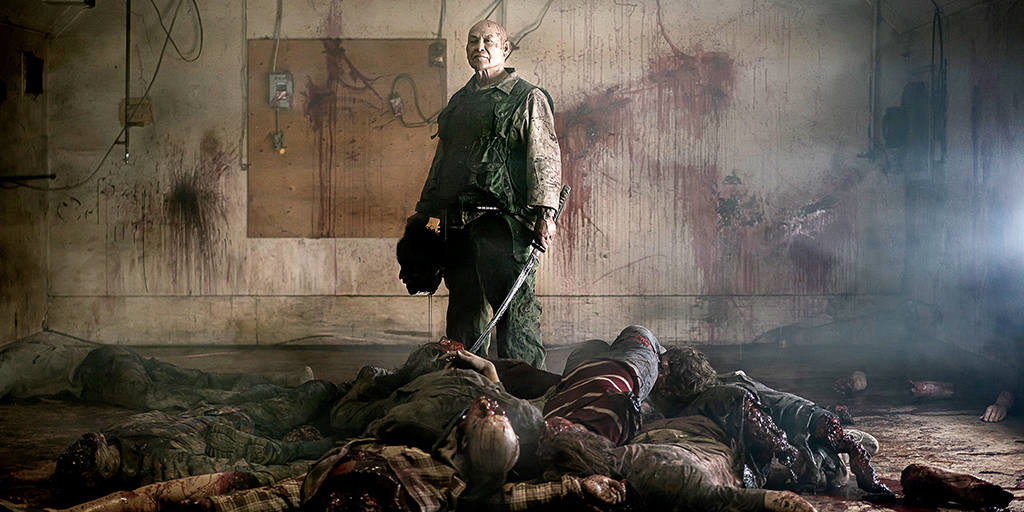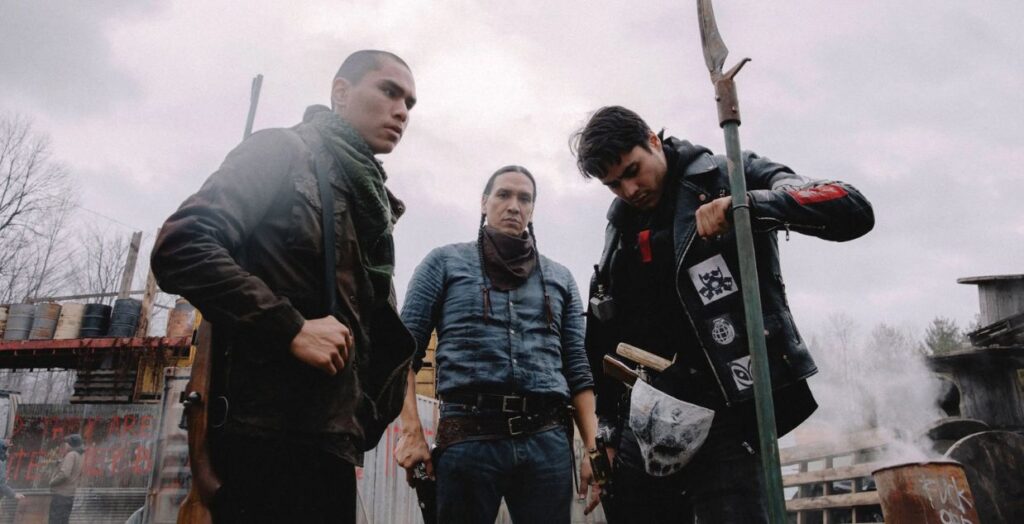While zombies are everywhere now and are often used for gore and guts, the famous horror monsters have long been used as a way to provide social commentary on the worlds where the infections hit. Starting with Geroge Romero’s scathing look at capitalism in Dawn of the Dead to Sang-ho Yeon‘s look at class structure and dynamics in Train to Busan, the common zombie can deliver a gut punch of relevancy when in the right hands. And there are no better hands than First Nations writer-director Jeff Barnaby‘s when it comes to Blood Quantum. Having opened TIFF’s Midnight Madness program in 2019, the film had its theatrical run impeded by the COVID-19 pandemic and has found its home on Shudder as a Shudder Exclusive title.
Blood Quantum is set on the Mi’gmaq reserve of Red Crow, and while the dead are coming back to life outside of it, its Indigenous inhabitants are immune to the zombie plague. Traylor (Michael Greyeyes), the tribal sheriff, must protect his family, apocalyptic refugees, and reserve riffraff from the hordes of walking white corpses. By positioning a community historically beset by real-life plagues and genocide and the victors of the land surviving while others fall, Barnaby creates a narrative that is not only unique but necessary. Through a zombie apocalypse, Barnaby presents viewers with a window into post-colonial Indigenous life and culture.
The film begins like a family drama in pacing with Traylor and his ex-wife Joss (Elle-Máijá Tailfeathers) dealing with the fallout from their son Joseph’s (Forrest Goodluck) drunken behavior which was fueled by his older half-brother Lysol (Kiowa Gordon). Then, the bites begin to happen fast, and once the pedal is pushed to the floor, it doesn’t let up. Instead of focusing on one time period around the outbreak, Blood Quantum jumps forward eight months to show the new world, the landscape of the dead and to showcase how Red Crow became the beacon of hope for townies. But this sparks a crucial debate: do you offer to help survivors, or do you let them die?

While this could have been represented as a simple morality story, Barnaby complicates it by giving Lysol, the vocal proponent of not being the white people’s savior, dialogue that outlines the history of genocide and racism from the past to the present. And as you watch, you can’t blame him. As an immune community, why not keep their gates shuttered?
Barnaby explores this question by showcasing ramifications for saving people, weaving an empathetic thread into Lysol’s character before showcasing the extreme and dangerous ends that his way of thinking involves. But in the end, helping people and saving people proves to be the path forward, even with the pain it can cause. While this film is very focused on the larger social commentary, covering large topics like substance abuse, colonialism, erasure, and more, Barnaby never forgets the issues that his characters are dealing with in the film.
There is a world of emotions in Blood Quantum’s story that mixes together and creates a narrative that is larger than the movie itself. That said, the action in the film is no afterthought. This film is brutal, bloody, and filled with imaginative kills and situations for characters to escape. Visually, every frame packs a punch and the choice to incorporate animated segments to drive home powerful points makes the film stand out even more than it already does.
The action and fighting elements of the film never feel too much, despite being ultraviolent, and while weapons we see in other zombie media come into play, their wielders set them apart. This is the case specifically for Gisigu (Stonehorse Lone Goeman), Traylor’s father, whose skill with a katana is not only exceptional but charismatic. While other films and series paint the elderly in communities as hindrances, Gisigu is the only reason for their survival in more than a few instances.

Blood Quantum is the best zombie film to come out of North America in quite some time. While this is a large statement, it’s also a testament to Barnaby’s ability as a visual storyteller who balances intimate character moments, social commentary, and buckets of spurting blood. There is nothing about Blood Quantum that goes as expected, which also means reviewing it is hard to do. Over the course of nearly two hours, the film subverts expectations and tropes of the zombie subgenre and stands heads and shoulders above other zombie content.
But perhaps the strongest takeaway from Blood Quantum is what happens when marginalized creators create genre stories. This is a film that only Barnaby could have made, telling a story that is rooted not only in his Indigenous culture but also in his personal experiences. This film brings both nuances and grandeur to a subgenre that is packed to the brim with stories that play out like paint-by-numbers. While everyone faces it, death is cultural. How we think about it, how we confront it, and how it impacts us is tied to the culture we come from. When reanimated corpses come into play, the only way to get new stories that break the mold is to open the door for creators with different experiences.
Overall, Blood Quantum is a zombie masterpiece. It’s everything I love about the horror genre; it’s everything I enjoy from zombies, and it does it all with buckets and buckets of blood. While self-quarantining has us all going stir crazy and infection on top of our minds, this is a film that should be added to your quarantine watch-list. To put it simply, Blood Quantum is the adrenaline-shot North American zombie films needed.
Blood Quantum is available exclusively on Shudder.
Blood Quantum
TL;DR
Blood Quantum is a zombie masterpiece. It’s everything I love about the horror genre, it’s everything I enjoy from zombies, and it does it all with buckets and buckets of blood. While self-quarantining has us all going stir crazy and infection top of mind, this is a film that should be added to your quarantine watch-list. To put it simply, Blood Quantum is the adrenaline shot North American zombie films needed.







